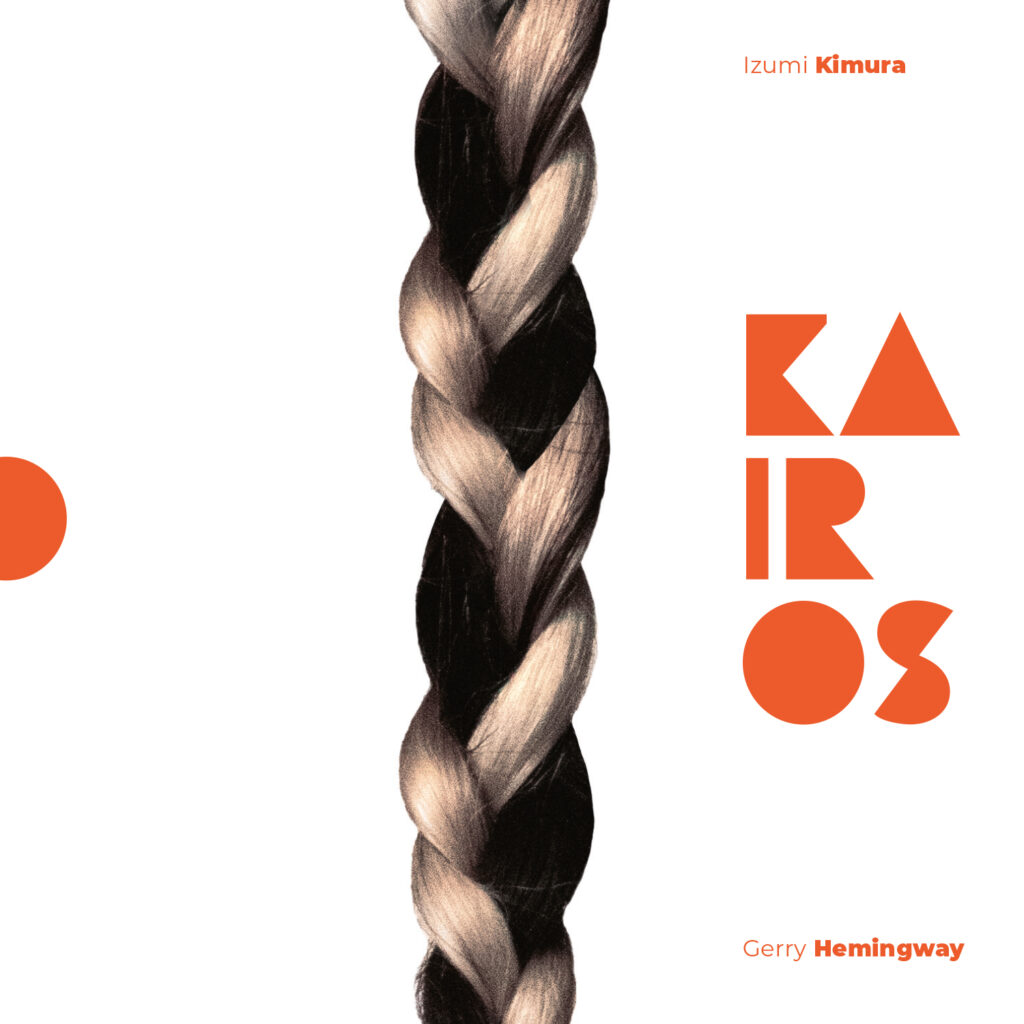‘Kairos’ is the new release from Izumi Kimura and Gerry Hemingway. Kimura is a pianist, originally from Japan, but now residing in Ireland. She has released several recordings, notably with contrabassist Barry Guy, trumpet player Artur Majewski (Vasco Trilla, Foton Quartet), and drummers Ramon Lopez and Gerry Hemingway. Much of Kimura’s work focuses on the subject of time.
Kimura has worked with Hemingway (Anthony Braxton, Leo Smith, Mark Helias, Michael Moore, Cecil Taylor, and more) since 2016, and on this album, he contributes drums, marimba, vibes, and vocals.
‘Kairos’is an intriguing and intensely interesting album because two percussive instruments – albeit one with the added dimension of strings struck by hammers – are melded in musical exploration and this duo has forged an effervescent and deeply engaging partnership, the percussive and string elements entwining to create a world of explorative and colourful music.
Kimura explores composition and improvisation. With a curiosity about the unknown, unseen worlds and questions about cultural beliefs, attitudes, and languages through the medium of improvisation, her techniques combine essences from jazz, classical, and Japanese cultures. As a musician who is not defined by any single genre, Kimura has played with musicians from classical, jazz, and improvised music. She has worked in different formats, from large groups to small ensembles. Just a few include RTE Symphony Orchestra, RTE Concert Orchestra, Crash Ensemble, Michael d’Arcy, Mia Cooper, Benjamin Dwyer, Gerald Barry, Kevin O’Connell, Ian Wilson, Fergus Johnston, Barry Guy, Ronan Guilfoyle, Michael Buckley, Oki Itaru, Dominique Pifarély, Benoît Delbecq, Stéphane Payen, Marco Colonna, Lina Andonovska, Mathew Jacobson, Nick Roth and more, musicians from the classical, jazz, and improvised music worlds. Her performances have included festivals and projects in Ireland, Belgium, Brazil, Poland, and many other countries.
‘Kairos’ demonstrates that music can link effortlessly across time, genres, and any preconceptions in the hands of the right performers. An intriguing track is the opening number, ‘Dendrochronology’. Dendrochronology is the science of looking back through wood and tree rings and counting the years, observing the different climates, and the changes that have occurred because tree rings show these–a journey through time by observations if you will. You can even see which type of pollen was prevalent at the time of each ring so a seemingly simple thing tells you much more than you might think. Here ‘Dendrochronology’ is something of a discovery. Every nuanced phrase depicts a slight change and offers a different way of hearing music, from dense, layered sections to lengthy, echoey profound moments, the piece seeming to depict the changes of time itself. Even the silences seem calculated and meaningful.
This album, from the eerie prescience of ‘Dendrochronology’ to the quirky, rhythmic changes of ‘Water Thief’, feels like effortlessly segued intonations depicting moments or brief periods within time, that offer differences and adaptations. For example, ‘Water Thief’ begins with predictable patterns before it develops into a multi-layered crescendo of stratified sounds, patterns, and entwined rhythms that ebb and flow, chop, and change as the track develops, echoing the changes that occur within time. Initially, you might think you know what to expect but you never do.
Then there are the rippling riffles and answers of ‘Chronostrata’ – literally, ‘layers of time’ with both percussive instruments conversing and the gentle, easiness of ‘Cloud Echoes’ and ‘Over The Tide’. The beautifully balanced ‘Kairos’ explores interchanging rhythms and delicate patterns, intertwined with heavy, ponderous guttural notes, countered by delicate percussive responses.
In Ancient Greek, ‘Kairos’ means ‘opportune’ or ‘perfect time’; the timing is all and how apt that this album is created around different time patterns and changing responses from either musician that stimulates a reactive phrase in the other.
This album has both delicacy and temporal heaviness as time itself seems to be changed, twisted, and reconstructed to become something else, dictated by the changeable patterns of the piano and percussion. Of intense interest is how the musicians communicate change and phrasing appears changed and different, yet the rhythmic basic remains continuous on most tracks – like time itself, it stops for no one and continues regardless of the changes we might introduce across the top – the time itself is relentless, unstoppable, like this music.
There are just eight tracks on the album. Five are duo improvisations, there is one track composed by each musician and one traditional song, and the latter three are largely improvised. This recording successfully unites classical and improvisation elements, doused with off-kilter and related rhythms over the continuum of time, in equal measure. This creates something of an ongoing conversation, even though it is via the very different mediums of percussive sounds on immovable vibrating solids objects versus percussive hampers on strings, with the echoes, and dampened notes thrown in. It demonstrates how beautiful communication can be with very different elements and also how wonderful combining different techniques and approaches can be –something we can perhaps all learn.
A delightful and inspiring recording. If you haven’t already, take a listen – it is about time.
https://www.gerryhemingway.com
Kairos– Izumi Kimura & Gerry Hemingway – Fundacja Słuchaj! (FSR07/2023)
Bandcamp: https://sluchaj.bandcamp.com/album/kairos
Four Videos supporting this release:
https://youtu.be/q0nKA63ymsM (Kairos Pt. 1)
https://youtu.be/ujSsJeAeyYQ (Kairos Pt. 2)
https://youtu.be/Gya2t7STU7A. (Kairos Pt. 3)
https://youtu.be/GNcFjh3DGMg. (Rivertide)





